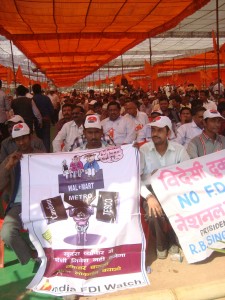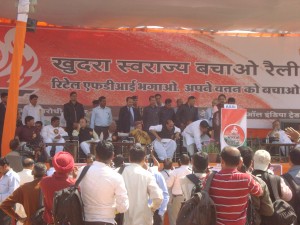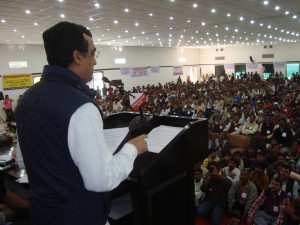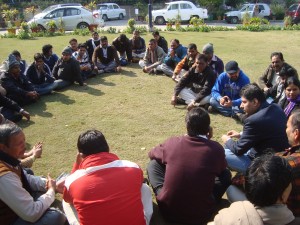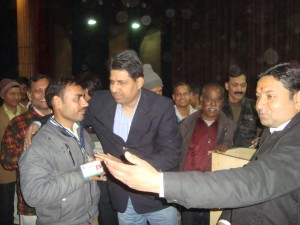Your cart is currently empty!
Day: March 16, 2013
-
Anti FDI Rally
March 7th, 2013Senior leaders of different political parties and retail stakeholders joined hands together at Save Retail Democracy Rally organised on 7thMarch at historical Ram Leela maidan of Delhi. All major wholesale and retail markets of Delhi remained closed on the day.Tens of thousands of retailers, farmers, hawkers, transporters, labourers, consumers, cooperatives, small scale industries and civil society organizations participated in the rally. An anthem “Jago Apne Watan Ko Bachao-Retail FDI Ko Bhagao” (wake up to save country and chase away Retail FDI) composed by noted bollywood music director Salim Suleman and conceptualised by leading Ad Company R.K.Swami BBDO was the star attraction of the rally.Senior Leaders of different political parties including BJP President Mr. Rajnath Singh, Leader of Opposition in Lok Sabha Smt. Sushma Swaraj, Leader of Opposition in Rajya Sabha Mr. Arun Jaitley, Chairman of Public Accounts Committ ee of Parliament Dr. Murli Manohar Joshi, NDA Convener & Janta Dal (U) President Shri Sharad Yadav, Senior CPI Leader Comrade A. B. Bardhan, Leader of CPM in Loksabha Comrade Basudev Acharya, Comrade Amarjeet Kaur and Shri Pawan Kumar of central trade unions addressed the rally. -
Hawkers Conference in Delhi
February 24th, 2013Hawkers Conference to read about our hawkers conference held yesterday in Delhi. More than one thousand street vendors gathered in the conference of Hawkers Joint Action Committee. The committee is initiated and facilitated by us. The central Minister announced for an act to issue vending licences to 2.5% of urban population. -
Food Security Bill
February 19th, 2013Dharmendra Kumar’s article on the Food Security Bill published today in Hindi Daily Prabhat Khabar. -
Anger Grows as Foreign Retailers Enter India
January 24th, 2013
The Minister meets Walmart CEO
Here is the official statement by Govt of India:
“Mr Doug McMillon, CEO Walmart International met Union Commerce Industry and Textiles Minster Shri Anand Sharma at Davos today and conveyed that Walmart is `excited about India’ and they are studying the conditions before making the final announcement.
Shri Sharma said that India’s Policy on FDI in Multi Brand retail has finality and they need not be unduly concerned about any policy reversal. Shri Sharma also asked them to send request for clarification, if any, in the written form to his Ministry. All necessary clarity will be provided, assured Shri Sharma.”
Swedish furniture manufacturer IKEA is the latest retail store set to expand into India. The government wants to attract much-needed infrastructure – while many shop owners fear for their livelihood.
Praveen Khandelwal’s hardware store in Delhi employs some 15 people. But soon, the shop owner fears, they might all lose their jobs – and with it, their livelihood.”International companies will grab the entire retail trade,” Khandelwal told DW. He is afraid that there will be no room for small-scale retailers like him. “Foreign companies will rule India!”
For a long time, India had very restrictive rules on Foreign Direct Investment (FDI). But in the last couple of years, restrictions have been loosened. In June, 2012, the government made some changes to its policies, allowing foreign retailers to operate with less restrictions in the country.
This, according to Gareth Price, a Senior Research Fellow at the British think-tank Chatham House, was aimed at building up much-needed infrastructure in particular in the agricultural sector. “India’s supply chain management is very poor. A lot of food is wasted before it even reaches the shops,” Gareth told DW. India, he added, lacked the resources to improve its infrastructure – the reason the ruling Congress Party decided to open the country to foreign investment.
Several foreign companies, including Wal-Mart, were quick to set up shop following the liberalization.
Highly divisive policies
In November, the government went even further, allowing for full ownership of local subsidiaries by foreign companies. Previously, foreign ownership had been limited to 51 percent.
Furniture manufacturer IKEA is the latest international retailer set to expand into India. On Tuesday, January 22, an Indian Commerce Ministry official said that the Investment Board had approved the Swedish company’s 1.9-billion-dollar investment proposal. IKEA announced it planned to open 25 stores in India over the next 15 to 20 years. The Cabinet, however, has yet to approve the bill and some Members of Parliament have already voiced their opposition. The opposition BJP party said that it would reverse the decision after the next elections, Price from Chatham House said.
The issue of foreign investment is highly divisive. Many Indians, Price said, fear that hundreds of thousands of jobs might be lost in the retail sector, one of the biggest employers in India.
“They will spread”
Dharmendra Kumar is one of them. “We’re not so concerned about IKEA,” the social activist with India FDI Watch, told DW. “They only make furniture, they won’t have much impact.” But he is concerned that while so far only a minority of India’s states have passed the FDI laws, others may soon follow suit. “And once they get here, they will spread.”
It was only a matter of time, he added, before foreign companies would start to have an impact on supply chains, dictate prices and force small- and medium-sized producers out of business.
With a little help from abroad
Amita Arora Puri from the All India Artisans and Craftworkers Association takes a less bleak view: IKEA with its “unmatched funds and global expertise” could help local artisans and traders to improve their designs, product quality and production abilities,” Puri told DW.
“The domestic private sector is looking for intellectual property of how foreign firms are doing things,” Price agrees. He added that, given India’s red tape and often excessive bureaucracy, foreign companies might find it hard to operate in India, letting the domestic sector take over. “That would seem a perfectly plausible outcome in the retail sector.”
Or, in one Twitter users’ laconic words: “50 percent of Ikea’s sales in India will be to furniture manufacturers who want to steal their designs.”
But Price doesn’t think that many foreign companies will commit themselves to India just yet, given the political opposition to the liberalization move. After all, he told DW, the opening was “reversible.”
Shop owner Praveen Khandelwal, for one, isn’t planning to wait and see. He wants to take his fear to the streets. “We’re working on a campaign against the foreign retailers,” he told DW, referring to a group of shop owners and retailers. “Just wait.”
-
Commission Inquiry on Walmart
Jan 24th, 2013The Union cabinet led by the Prime Minister today approved the one man commission inquiry on Walmart lobbying in India. The inquiry Commission would be set up under the Commission of Inquiry Act, 1951 and would submit its report within three months of its constitution. As per this act it would be obligatory for the Govt. to table the inquiry report and action taken report in the Parliament.The terms of reference of the Committee are as follows:-(i) To inquire into recent media reports on disclosures of Wal-Mart before the US Senate regarding their lobbying activities and details.(ii) Whether Wal-mart undertook any activities in India in contravention of any Indian law. (iii) Any other matter relevant or incidental to the above.
-
Retail FDI: How will you protect small traders, Supreme Court asks Goverment
Jan 22nd, 2013The Supreme Court today said that interest of small retail traders should not be affected due to foreign direct investment (FDI) in retail sector and sought response from the Centre on how it intends to safeguard their interests.A bench headed by Justice R M Lodha asked the Centre to file its response within three weeks.“What checks are there to ensure that free trade is not affected, particularly the interest of small traders,” the bench said while hearing a public interest litigation (PIL). “Apprehension is there in the mind of people that small traders’ interest would be affected,” the bench said, adding, “Some regulatory measures should be there.” -
Id Cards for Hawkers
January 21st, 2013East Delhi Municipal Corporation today inaugurated the Identity card distribution to hawkers of Weekly markets. Mr. Sunil Jha, Chairman, Licensing and Tehbazaari Committee, EDMC distributed the Id cards to hawkers (photo attached) at the program organized at EDMC headquarters. The Hon’ble Mayor, Standing Committee Chairman, Leader of the House, Leader of the opposition and many of the Councillors were also present on the occasion.Later, we held a meeting of hawkers in the EDMC park. -
National Convention Against FDI in Retail to be Held
January 15th, 2013
A National Convention against FDI in Retail is being organized on 16th January at NDMC ConventionCentre, Parliament Street, New Delhi. Senior leaders of various political parties are expected to join theconvention including the leader of the opposition Smt. Sushma Swaraj, NDA Convener Sh. SharadYadav, CPI Secretary Comrade A B Bardhan and the senior BJP leader Sh. Murli Manohar Joshi.
President and General Secretaries of small retailers’ federations from across the country will be participating inthe convention. Along with traders and hawkers leaders of Delhi leaders from Punjab, Haryana, Himachal Pradesh,Maharashtra, Tamil Nadu, Andhra Pradesh, Madhya Pradesh, Uttar Pradesh, Kerala, Rajasthan etc. are joining the convention.
-
Is India Ready for Global Retailers?
December 7th, 2012
-
Retail FDI: India plans to amend its antiquated labour laws
December 6th, 2012
NEW DELHI: The government plans to revolutionise the retail sector to make India a global shopping hub, with new labour laws to support 24-hour business, limiting reckless multiplication of malls to prevent urban chaos, and strong measures to ensure small shopkeepers also thrive in the transformation.
The consumer affairs ministry also wants to allow farmers to directly sell their produce to retailers, and adopt a uniform countrywide licensing regime to accelerate retail growth. The issue of modernising retail to ensure that benefits reach every section of society was debated in the cabinet when it approved FDI in multi-brand retail.
To facilitate such far-reaching changes, the government plans to set up a committee of central ministers of agriculture, commerce, corporate affairs, environment, finance, food, labour, railways, urban development and infrastructure ministries, official sources said.
Another panel of secretaries, representatives from IIMs, industry bodies, consumer activists and trader associations will also study the retailing sector. The move is expected to bring on board small traders and shopkeepers, who are apprehensive about loss of business if large international companies set up shop in India.
Traders welcomed the move. “This is a fantastic method to take things forward… It will smoothen out trade at pan-India level,” said Kumar Rajagopalan, head of Retailers Association of India, which has 400 modern retailers as members.
The government panel will discuss ways to modernise labour laws and amend them to be more supportive of retail requirements pushing for 24x7x365 work environment. It will also look at means to reduce multiple licensing requirements and offer a single-window facility for retail operations throughout the country.
Safeguards for Small Stores
“It will also consider establishing a national commission to study the problems of retail sector,” said a consumer affairs ministry official.
Madan Sabnavis, chief economist at CARE Ratings, said the government has safeguarded interests of small kirana shopowners and manufacturers in its notification on FDI in retail by ensuring 30% outsourcing from local small and medium industries. “Walmart, if it comes, can’t open 30-40 stores at one location even in cities like Delhi and Mumbai.
It gives enough space for small stores to operate, which can thrive on their doorstep services. The government should modernise APMC Act to create direct linkage of farmers with retailers,” he said.
However, Dharmendra Kumar, director, India FDI Watch, an NGO that has opposed the entry of foreign retailers, said the government should have sufficient regulatory framework to control the rampage of foreign retailers entering the Indian space. “There is no cap on the number of stores a big retailer can open in a city. Nor there is any specification on size of the store. In absence of such regulations, these supermarts can open in any location interfering with the operations of small stores,” he said.
The panel, however, is looking at putting some safeguards in place to help small stores. “It will work out a legal and regulatory mechanism to ensure that large retailers don’t displace small ones and even misuse their higher buying power to create a one-sided price war besides setting up in-built policy to relocate or reemploy people who are affected due to opening up of big malls in the vicinity of their shops,” another official of consumer affairs ministry said. The committee will also consider recommendations of the parliamentary standing committee on retail sector, and suggestions of the study on organised retail by the Indian Council for Research on International Economic Relations (ICRIER).
ICRIER had endorsed the entry of branded chains in retail sector, saying the sector is likely to grow at 13% till 2011-12 with organised retail growing at 45-50% in this period and unorganised retail at about 10%.
A recent study by ICRIER on facilitating trade has argued that pan-India supply chains cannot be established unless GST is implemented. Arpita Mukherjee, professor, ICRIER, said retailers face multiple regulations that vary across states and this creates hurdles for smooth functioning.
“For example, the central government can have a model Shops and Establishment Act that states can implement. This Act should have provisions for modern retail to operate such as possibilities to employ on a rotational basis and flexibilities in shop opening timings. If these reforms are implemented within two years, it will lead to investment in backend and help to reduce wastage,” she said.

